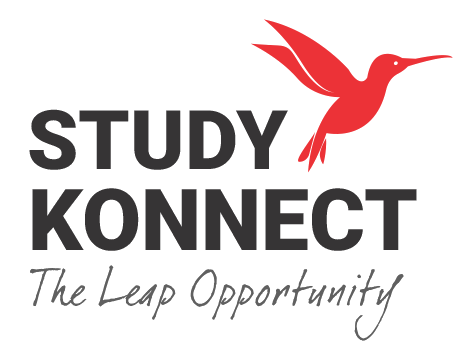Study in Germany with StudyKonnect
Germany is one of the most sought-after destinations for international students, renowned for its excellent education system, state-of-the-art research facilities, and globally recognized degrees. At StudyKonnect, we provide comprehensive guidance to help you navigate the process of studying in Germany for your bachelor’s or master’s program.

Contact Details
- # 45, 1st Floor, Ajay Market, Punjab Avenue, Near Urban Estate Phase 2, Jalandhar
- info@studykonnect.com
- +91 88727-88721
Contact Details
- # 45, 1st Floor, Ajay Market, Punjab Avenue, Near Urban Estate Phase 2, Jalandhar
- info@studykonnect.com
- +91 88727-88721
Study in Germany with StudyKonnect
Germany is one of the most sought-after destinations for international students, renowned for its excellent education system, state-of-the-art research facilities, and globally recognized degrees. At StudyKonnect, we provide comprehensive guidance to help you navigate the process of studying in Germany for your bachelor’s or master’s program.

Advantages of Studying in Germany
6. Cultural Diversity: Experience Germany’s rich culture, vibrant cities, and scenic landscapes while studying in a multicultural environment.
Types of Educational Institutions
Germany has two primary types of higher education institutions for bachelor’s and master’s programs:
1. Universities (Universitäten):
- Focus on academic and theoretical learning.
- Ideal for programs like engineering, sciences, or humanities.
- Example: Technical University of Munich (TUM), Heidelberg University.
2.Universities of Applied Sciences (Fachhochschulen):
- Emphasize practical and industry-oriented education.
- Popular for programs in business, IT, or design.
- Example: Hochschule Bonn-Rhein-Sieg, Munich University of Applied Sciences.

Fee Structure
1. Public Universities:
- Most public universities do not charge tuition fees for bachelor's programs, with only a nominal semester fee ranging from €150 €350.
- Master’s programs may have tuition fees if the program is non consecutive (not directly related to a previous degree).
2. Private Universities:
- Tuition fees range from €10,000 to €20,000 per year depending on the program and institution.
Scope of Scholarships
Germany offers numerous scholarships for international students to ease financial burdens:
1. DAAD Scholarships: Germany’s largest scholarship organization offering funding for all levels of study.
2. Erasmus+: Provides funding opportunities for international students within Europe.
3. University-Specific Scholarships: Institutions like RWTH Aachen or TU Berlin offer scholarships to outstanding students.
4. Private Foundations: Organizations like Heinrich Böll Foundation or Friedrich Ebert Foundation provide financial aid for specific fields or backgrounds.
Our team at StudyKonnect will assist you in identifying and applying for the best scholarship options.
Available Programs
Germany offers a wide range of programs tailored to various interests and career paths:
1. Engineering & Technology: Mechanical Engineering, Computer Science, Mechatronics.
2. Business & Economics: MBA, International Business, Finance.
Many programs are taught in English, making them accessible to international students without fluency in German.
Application Process to Obtain an Offer Letter from a German University
Step 1: Research and Choose Your Program
- Identify the course you wish to pursue and check its requirements on the university’s website.
- Choose programs taught in English or German based on your proficiency.
Step 2: Check Eligibility
- Review the academic qualifications required for the program.
- For Bachelor’s programs: Submit proof of 12 years of schooling.
- For Master’s programs: Provide a recognized undergraduate degree.
Step 3: Prepare Your Documents
Commonly required documents include:
- Academic transcripts and certificates (Class 10, 12, or Bachelor’s degree).
- Statement of Purpose (SOP).
- Letters of Recommendation (LORs).
- Resume/CV.
- English/German language proficiency test scores (IELTS/TOEFL/TestDaF).
- Passport copy.
- Portfolio (if required for design or arts programs).
- Application fee receipt (if applicable).
Step 4: Apply to the University
- Submit your application directly through the university’s portal or via uni-assist, the centralized application platform for many German universities.
- Ensure that your documents are correctly translated and notarized (if required).
Step 5: Await Confirmation
- After the application review, the university will send you an offer letter if you meet their criteria.
- Some universities may require an interview or entrance exam before issuing an offer letter.

Application Process to Obtain an Offer Letter from a German University
Step 1: Obtain an Offer Letter from a German University
- Ensure you have an unconditional admission letter (Zulassungsbescheid) from a recognized university.
Step 2: Open a Blocked Bank Account (Sperrkonto)
- Deposit the required amount (~€11,208 for one year as of 2025) into a German blocked account to demonstrate financial solvency.
- Banks like Fintiba, Expatrio, or Deutsche Bank offer blocked account services.
Step 3: Book a Visa Appointment
- Schedule an appointment for a student visa (National Visa – D type) through the German Embassy or Consulate website.
Step 4: Prepare Visa Documents
Ensure all documents are complete and accurate. You’ll typically need:
- Completed visa application form.
- Passport (valid for at least six months).
- Two biometric passport photos.
- Proof of financial resources (blocked account or scholarship letter).
- Proof of health insurance (temporary travel insurance, later replaced by German health insurance).
- Academic transcripts and certificates.
- Language proficiency test scores.
- Statement of Purpose (SOP).
- Proof of accommodation in Germany (rental agreement or confirmation from the university).
- Demand draft for visa processing fee (~€75).
Step 5: Attend the Visa Interview
- Be punctual and answer all questions confidently.
- Expect questions about your academic background, reasons for choosing Germany, and post-study plans.
Step 6: Wait for Visa Approval
- Visa processing typically takes 4–12 weeks. Stay in touch with the consulate if additional documents are required.
Step 7: Travel to Germany
- Once your visa is approved, plan your travel.
- After arriving in Germany, register at the local registration office (Einwohnermeldeamt) and obtain your residence permit.
Tips for a Successful Application
- Start the process early, at least 6–9 months before the course begins.
- Double-check document requirements for each university and consulate.
- Keep digital and physical copies of all documents.
- Be honest and clear during your visa interview.

By following these steps, you’ll be well on your way to studying in Germany with ease. At StudyKonnect, we’re here to guide you through every step of your academic and visa journey. Reach out for personalized support!
Why Choose StudyKonnect?
At StudyKonnect, we simplify your journey to study in Germany by providing:
- Expert guidance on choosing the right program and institution.
- Assistance with application and documentation processes.
- Support in securing scholarships and managing finances.
- Personalized counseling for pre-departure preparation.
